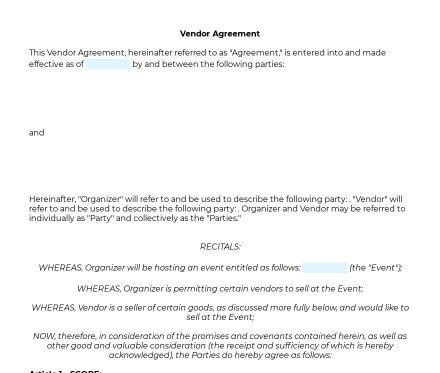Vendor Agreement Free
When two parties - a vendor and an organizer - agree to sell the merchandise at an event arranged by the organizer, they can use this Vendor Agreement. With this document, the parties agree that the seller will pay the organizer for a place to sell the vendor's goods.


 Template Overview
Template Overview
When two parties - a vendor and an organizer - agree to sell the merchandise at an event arranged by the organizer, they can benefit from this Vendor Agreement. This document is also known as the Vending Agreement. With this document, the parties agree that the seller will pay the organizer for a place to sell the vendor's goods.
These types of arrangements are particularly popular at short-term events such as fairs or markets. Thus, this contract can be used in situations where the organizer temporarily allows the seller to sell his goods.
This agreement covers everything required for a contractual relationship like this.
You fill out a form. The document is created before your eyes as you respond to the questions.
At the end, you receive it in Word and PDF formats. You can modify it and reuse it.
 How to use this template
How to use this template
When a vendor wants to sell his goods at an organizer's event, he can use this document. The document may also be used by the organizer who agrees to provide the vendor with a point of sale. The terms of the document are equal on all sides and especially suitable for organizers who are usually engaged in such activities.
In the document, the parties provide identifying information about themselves and describe the main features of the agreement, event details, date, fees, etc.
There will also be general contract provisions included, which cover the state location for any disputes, as well as other general terms.
A completed document should be printed and signed by both parties. We recommend keeping copies in case any future disputes arise.
 Applicable law
Applicable law
In the US, both specific-state and Federal laws govern Vendor Agreements. Federal laws may restrict what can be sold; for example, no one may not contract to sell anything illegal.
Ready to build your document from this template?


 Please wait
Please wait
